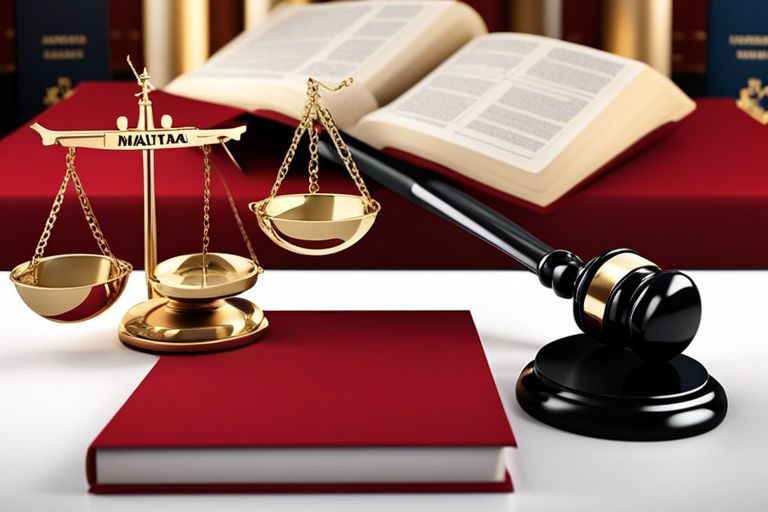The Beginner’s Guide to Malta’s Legal System

Malta, an archipelago in the Mediterranean, boasts a unique legal system that blends elements of civil law and common law. Understanding the key principles of Malta’s legal system is crucial for both locals and visitors to navigate the complexities of the country’s laws and regulations.
An Overview of the Maltese Legal System
While the Maltese legal system may seem complex to beginners, understanding its historical development and current structure is crucial to navigating its various laws and regulations.
Historical Development
For centuries, Malta’s legal system has been influenced by various civilizations that ruled the island, including the Phoenicians, Romans, Arabs, Normans, and Knights of St. John. Each conqueror left its mark on Malta’s legal framework, creating a unique blend of laws and traditions that still resonate today. The most significant influence can be attributed to the Code de Rohan, established during the rule of the Knights of St. John in the 18th century.
Current Structure and Governance
For over 50 years, Malta has operated as an independent republic with a parliamentary system of government. The legal system is based on a combination of civil law and common law principles, with the Constitution of Malta serving as the supreme law of the land. The judiciary is made up of various courts, including the Constitutional Court, Court of Appeal, and Court of Criminal Appeal. The legal profession in Malta is regulated by the Chamber of Advocates, ensuring that lawyers adhere to high ethical standards and provide competent legal representation to clients.
System: The Maltese legal system operates under the principle of the rule of law, ensuring that all individuals are subject to the same laws and regulations. The government is structured to provide checks and balances, with the President of Malta serving as the head of state and the Prime Minister leading the executive branch. The Maltese legal system is renowned for its commitment to upholding human rights and promoting justice for all citizens.
Types of Law in Malta
Constitutional Law
|
Substantive Law
|
Constitutional Law
With a strong emphasis on the protection of individual rights and the distribution of powers within the government framework, Constitutional Law forms the foundation of the legal system in Malta. The Maltese Constitution, adopted in 1964 upon gaining independence from the United Kingdom, outlines the fundamental rights of citizens, the structure of government institutions, and the division of powers between the executive, legislative, and judicial branches.
Civil Law
Some of the key areas covered under Civil Law in Malta include contracts, property rights, family law, and inheritance. Civil Law is heavily influenced by the French legal system due to Malta’s history of French rule in the 19th century. A notable feature of Civil Law is its emphasis on written laws and codes, which provide clear guidelines for resolving disputes and legal issues.
Assume that in a civil case in Malta, the court will primarily rely on the Civil Code and other statutory laws to reach a decision.
Criminal Law
Now, when it comes to Criminal Law, Malta follows a mix of common law principles and statutory laws. Criminal offenses are defined in the Criminal Code of Malta, outlining various crimes and their corresponding penalties. The criminal justice system in Malta operates through its courts, with criminal proceedings following a defined legal process to ensure a fair trial for all individuals accused of crimes.
For instance, in a criminal case in Malta, the burden of proof lies with the prosecution to establish the guilt of the accused beyond a reasonable doubt.
Commercial Law
Property rights, trade regulations, and business transactions fall under the purview of Commercial Law in Malta. Businesses operating in Malta must adhere to commercial laws governing aspects such as contracts, partnerships, and consumer protection. Commercial Law aims to regulate and facilitate commercial activities, ensuring fair competition and protecting the rights of consumers and businesses alike.
Another important aspect of Commercial Law in Malta is the regulation of financial services, including banking, insurance, and investment activities, to maintain the integrity and stability of the financial sector.
Administrative Law
Little know that in Administrative Law, the focus is on regulating the actions of administrative agencies and public officials to ensure they act within the confines of the law and adhere to legal principles. Administrative Law encompasses a wide range of areas, including public procurement, planning and development regulations, and administrative decision-making processes.
To safeguard against abuse of power and ensure accountability, Administrative Law provides mechanisms for challenging administrative decisions through judicial review and other legal remedies.
The Court System of Malta
After providing an overview of Malta’s legal system, it is crucial to examine into the structure of its court system. Understanding the hierarchy and functions of the various courts in Malta is crucial for anyone seeking legal recourse or navigating the country’s legal framework.
Inferior Courts
On the lower rung of the court system in Malta are the Inferior Courts, which handle less serious criminal and civil cases. These courts are decentralized and spread across different localities to ensure accessibility to justice for all citizens. Cases heard in the Inferior Courts usually do not involve complex legal issues and are resolved by a single magistrate.
Superior Courts
On the higher end of the judicial hierarchy are the Superior Courts in Malta, which consist of the Court of Appeal and the Constitutional Court. The Superior Courts have the authority to hear appeals from the Inferior Courts and handle more complex legal matters that require in-depth legal expertise and analysis.
Malta’s Superior Courts play a crucial role in ensuring that justice is served and upholding the rule of law in the country. They are integral to the legal system’s functioning and provide a means for parties to seek redress in cases where the stakes are higher.
The Constitutional Court
Criminal law in Malta is overseen by the Constitutional Court, which is responsible for interpreting the constitution and ensuring that laws are in compliance with it. This specialized court plays a vital role in safeguarding the fundamental rights and freedoms of individuals, making it a cornerstone of Malta’s legal system.
Courts in Malta must adhere to the rulings and interpretations of the Constitutional Court, which holds immense power in shaping the legal landscape of the country. Its decisions have far-reaching implications and set important precedents for future cases.
The Small Claims Tribunal
Under the umbrella of the Courts of Malta, the Small Claims Tribunal offers a simplified and expedited process for resolving minor disputes between parties. This tribunal provides a cost-effective and efficient way for individuals and small businesses to seek resolution without the need for lengthy and costly legal proceedings.
The Small Claims Tribunal is designed to promote access to justice and facilitate the swift resolution of straightforward disputes. It is particularly beneficial for resolving small financial claims or disputes that do not warrant the involvement of higher courts.
Specialized Tribunals
Criminal law is not the only area that requires specialized attention in Malta. The country also has a range of specialized tribunals that focus on specific areas of law, such as industrial relations, intellectual property, and taxation. These tribunals are staffed with experts in their respective fields and handle cases that require specialized knowledge and expertise.
The establishment of Specialized Tribunals underscores Malta’s commitment to ensuring that all areas of law are dealt with comprehensively and efficiently. By having tribunals dedicated to specific legal areas, the country can ensure that cases are handled by professionals with the necessary expertise.
Legal Professionals in Malta
Now let’s investigate the world of legal professionals in Malta. Whether you are seeking legal advice, representation in court, or assistance with legal documentation, understanding the various roles within the legal system is crucial.
Advocates and Legal Procurators
You will encounter two main types of legal professionals in Malta: advocates and legal procurators. Advocates are lawyers who are qualified to represent clients in court and provide legal advice on a wide range of matters. Legal procurators, on the other hand, specialize in representing clients in specific legal proceedings, such as civil cases and administrative law matters.
Notaries and Legal Executives
With a unique role in the legal system, notaries and legal executives play a crucial part in the legal processes of Malta. Notaries are responsible for drafting and verifying legal documents, such as wills, contracts, and property deeds. Legal executives, on the other hand, assist lawyers in conducting legal research, preparing cases, and managing administrative tasks within law firms.
Malta is known for its highly skilled legal professionals who uphold the integrity and efficiency of the legal system. Whether you are in need of legal advice for personal matters or business transactions, the expertise of Malta’s legal professionals is unmatched.
The Role of the Attorney General and the Judiciary
The Attorney General serves as the legal advisor to the government of Malta and oversees criminal prosecutions on behalf of the state. The judiciary, consisting of the Superior Courts and Inferior Courts, interprets and upholds the laws of Malta, ensuring justice is served in all legal matters.
The independence and impartiality of the Attorney General and judiciary are crucial for maintaining the rule of law in Malta. Their roles ensure that legal decisions are made fairly and in adherence to the constitution and legal principles of the country.
Understanding the roles and responsibilities of legal professionals in Malta is crucial for navigating the legal system with confidence and clarity. Whether you are a resident, business owner, or visitor in Malta, knowing who to turn to for legal assistance is key in ensuring your rights and interests are protected.
Tips for Navigating Malta's Legal Processes
Despite the complexities of Malta’s legal system, there are ways to navigate through its processes effectively. Here are some tips to help you maneuver through the legal landscape in Malta:
Dealing with Civil Disputes
With civil disputes, it is necessary to seek legal advice from a qualified lawyer specializing in civil law. Make sure to gather all relevant documents and evidence to support your case. Consider alternative dispute resolution methods such as mediation or arbitration before heading to court. Understanding your rights and obligations under Maltese law is crucial in resolving civil disputes efficiently.
Navigating Criminal Proceedings
Tips for navigating criminal proceedings in Malta include seeking immediate legal representation if you are accused of a crime. Understand the charges against you and cooperate with law enforcement within the boundaries of your rights. It is advisable to refrain from making any statements or signing documents without the presence of your legal counsel. The right legal representation can significantly impact the outcome of criminal proceedings in Malta.
This subsection provides valuable guidance on the key steps to take when facing criminal charges in Malta. It emphasizes the importance of legal representation and understanding the legal processes involved in criminal proceedings.
Engaging with Administrative Matters
Matters concerning administrative procedures in Malta can be intricate. It is advisable to familiarize yourself with the relevant laws and regulations that govern administrative processes. Seek advice from legal experts or administrative professionals to ensure compliance with administrative requirements. Keep meticulous records of all communications and transactions related to administrative matters for future reference.
Maltas administrative procedures play a significant role in various aspects of daily life, including business operations, residency applications, and property transactions. Understanding and adhering to administrative protocols are vital for a seamless experience in dealing with administrative matters in Malta.
Step-by-Step Guide to Legal Procedures
Not everyone is familiar with the legal procedures in Malta. Understanding the steps involved in legal actions can help individuals navigate the system more effectively.
| Initiating Legal Action | Participating in a Legal Trial |
| When initiating legal action in Malta, individuals must first consult with a lawyer to assess their case’s merit. The lawyer will then file the necessary paperwork with the appropriate court to start the legal process. | Legal trials in Malta typically involve presenting evidence, examining witnesses, and making legal arguments in court. It’s vital for participants to follow court procedures and comply with legal guidelines throughout the trial. |
Initiating Legal Action
Legal proceedings in Malta begin with the plaintiff, who files a formal complaint or claim against the defendant. The defendant then has the opportunity to respond to the allegations and present their defense in court.
Participating in a Legal Trial
Step-by-step participation in a legal trial is crucial for a fair and just outcome. Individuals involved should adhere to the court’s instructions, respect the legal process, and cooperate with legal representatives to ensure a smooth trial process.
Guide: Understanding the legal trial process can be challenging for individuals unfamiliar with the legal system. Seeking legal guidance and representation can significantly aid in navigating the complexities of a court trial.
Filing Appeals and Post-Trial Steps
With the conclusion of a trial in Malta, parties involved have the right to file appeals if they believe the court’s decision was unjust. Post-trial steps may include enforcement of court orders, compliance with legal judgments, and resolution of any outstanding legal matters.
It is crucial to carefully review and consider all options before filing an appeal, as the outcome can significantly impact the parties involved. Seeking legal advice for post-trial steps is advisable to ensure compliance with legal obligations and maintain legal rights.
Considerations When Dealing with Malta's Legal System
Factors Affecting Legal Outcomes
To successfully navigate Malta’s legal system, it is crucial to consider various factors that can influence legal outcomes. The key factors affecting legal outcomes in Malta include the quality of legal representation, the complexity of the case, the efficiency of the courts, and the applicable laws and regulations. It is important to thoroughly understand these factors to be prepared for any legal proceedings in Malta.
- Quality of legal representation
- Complexity of the case
- Efficiency of the courts
- Applicable laws and regulations
Any mishandling of these factors can significantly impact the outcome of legal proceedings in Malta. Therefore, it is crucial to meticulously assess these factors to ensure a favorable legal outcome.
Pros and Cons of Legal Processes in Malta
Legal processes in Malta have their own set of advantages and disadvantages that individuals should be aware of. Below is a breakdown of the pros and cons of legal processes in Malta:
| Pros | Cons |
| Clear legal framework | Costly legal procedures |
| Efficient court system | Lengthy court proceedings |
| Experienced legal professionals | Language barriers |
Understanding the advantages and disadvantages of legal processes in Malta is crucial for individuals seeking legal remedies. It allows for better decision-making and preparation for any legal proceedings in the country.
Summing up
In the final analysis, the legal system in Malta is a combination of Civil Law and Common Law principles, influenced by its history of being a former British colony and a member of the European Union. Understanding the different sources of law, court hierarchy, and legal professionals is necessary for anyone navigating the Maltese legal system.
By familiarizing yourself with the legal framework in Malta, you can better protect your rights and interests in various legal matters. Whether you are a resident, visitor, or business owner in Malta, having a basic understanding of the legal system can help you navigate legal challenges effectively and uphold the rule of law.
Recommended Posts

Financial Aspects of Doing Business in Malta
July 26, 2024

EveryMatrix & beBettor Ensure Safer UK Gambling
July 26, 2024




